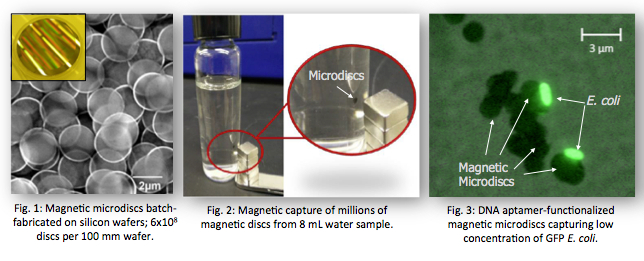
The overall goal of this SBIR effort is to develop a rapid, portable system to test for presence and viability of coliform bacteria and E. coli in field water samples. The end system will be portable, battery-powered, reusable, easy to use, and selective to the specific indicator organism.
Clean drinking water is a mission-critical asset for deployed defense personnel. The presence of pathogenic bacteria in water systems can cause widespread illness and even death, and thereby significantly hinder warfighter readiness and effectiveness. Army, Air Force and Navy preventive medicine personnel all share similar potable water monitoring requirements, which includes monitoring indicator organisms that are linked to fecal contamination such as generic Escherichia coli (E. coli.) and coliform bacteria [1] The total concentration of bacterial coliforms (i.e., non spore-forming Gram negative bacteria) is used as an indication of overall sanitary quality, and generic E. coli presence is a hallmark indicator for fecal contamination and potential waterborne pathogens. However, the current approved methods require extensive time and personnel training and thus there is a critical technology gap for rapid, on-site detection of microbial contamination, which is especially important for testing drinking water sources such as surface water, ground water, or host-nation municipal water systems. Further, current field-ready methodologies for detecting fecal organism(s) have challenges related to false positives from non-targets (e.g., microorganisms, native flora, particulate matter), and lack the ability to discriminate between viable and non-viable bacteria.
The innovation of this work is the combination of enabling micro/nanotechnologies under development at the University of Florida for rapid concentration/purification of target bacteria from raw water samples, viability discrimination using fluorescent labels, and subsequent analysis using simple imaging via a portable microscope or smartphone. This system will profoundly improve water-testing protocols by reducing test time, cost, and logistical burden. Such advancements will not only fill a critical technology gap unmet by any other competing technology for defense environments, but also potentially improve sanitation and food safety in other public and private domains (farms, municipal water systems, hospitals/clinics, etc.)

